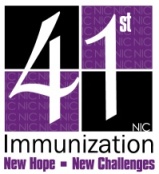
|
|
CDC NIP/NIC Home Page
|
Monday, March 5, 2007 - 2:25 PM
8
Routine MCV Vaccination in the Presence of Vaccine-Associated Guillain-Barré Syndrome - Decision Analysis Approach
Bo-Hyun Cho, McKing Consulting Corporation, 1600 Clifton Rd. NE, Mailstop E-52, Atlanta, GA, USA, Thomas Clark, Meningitis and Special Pathogens Branch, DVD/NCIRD/CDC, Nancy Rosenstein Messonnier, Meningitis And Vaccine Preventable Diseases Branch, DVD/NCIRD/CDC, and Mark Messonnier, Health Services Research And Evaluation Branch, ISD/NCIRD/CDC, 1600 Clifton Road, NE, MS-E52, Atlanta, GA, USA.
Learning Objectives for this Presentation:
By the end of the presentation participants will be able to compare the health outcomes of vaccination against meningococcal disease to the health outcomes with no vaccination in the presence of the risk of Guillain-Barré Syndrome (GBS).
Background:
In early 2005, a tetravalent meningococcal conjugate vaccine (MCV4) was licensed in the United States. Subsequently, the Advisory Committee on Immunization Practices recommended routine vaccination of adolescents beginning at age 11. Since then, a total of 17 cases of GBS after MCV4 vaccination have been reported. Yet, because of the risk of meningococcal disease and the associated morbidity and mortality, routine vaccination with MCV4 continues to be recommended.
Objectives:
To evaluate the health outcomes without MCV4 vaccination to health outcomes with vaccination in the presence of risk of vaccine-attributable GBS.
Methods:
A hypothetical cohort of 4 million 11 year-old was considered in a simulation model over an 8-year period. The vaccinated group was assumed to be at increased risk of vaccine-attributable GBS within the first 6 weeks after vaccination (0.2 per 100,000 person-months). Vaccine efficacy was assumed to remain at 93% during an 8-year period. GBS morbidity rate, case fatality rate of meningococcal disease, health utility indices of sequelae and their probabilities were collected from published articles and unpublished Active Bacterial Core Surveillance (ABCs) data.
Results:
Projected outcomes show that routine MCV4 vaccination would prevent 163 cases of disease and 16 deaths associated with the disease at 70% coverage. However, it might result in 3 cases of vaccine-attributable GBS. Consequently, MCV4 vaccination would save 1,041 life years and 446 quality adjusted life years (QALYs) while vaccine-attributable GBS could cause 3 QALYs lost. At doubled vaccine-attributable GBS risk, vaccination is still favored.
Conclusions:
Results indicate the benefits of MCV4 vaccination outweigh the risk of vaccine-attributable GBS. Unless the risk reaches an unacceptable level, vaccination should continue.
Web Page: www.cdc.gov/od/science/iso/gbsfactsheet.htm